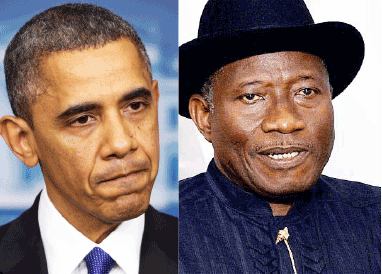As the United States still basks in the euphoria of its 238th birthday, Special Correspondent, SAM NWOKORO, looks at Uncle Big Sam’s relationship with Africa’s most populous country…
Last week, precisely, Friday July 4, the United States of America, aka Uncle Big Sam, clocked 238.
U.S President, Barack Obama and Nigeria’s President, Goodluck Jonathan
Across the nation, Americans celebrated the 238th anniversary of their country’s independence from Britain with parades, picnics, fireworks, rodeos and concerts. The famous Fourth of July festivities in Washington include re-enactors portraying historical figures, including Thomas Jefferson, Benjamin Franklin and John Adams, who read the Declaration of Independence. There was a concert and fireworks on the National Mall on Friday night.
However, the weather somehow dampened the plans of millions of Americans as Hurricane Arthur makes its way up the East Coast.
Founded by a seaman called Christopher Columbus who first gathered the red Indians into one place, the U.S. has over time evolved into not just a nation, but a living institution, a mother of many nations, and all nations, a pacesetter in noble values, a pivotal role model in nurturing modern states, a stabiliser of the world’s chaotic and explosive power structures, a pastoral expositor of human freedoms, and an unflinching advocate of a global world order in which the whites and the blacks, the Jews and the Pharisees, the rich and the poor, the master and the servant, the slave and the free born must live as one human family without fear of oppression and extermination.
A timeless value system
If there is indeed any nation on earth today that has found America a worthy friend, it is Nigeria. No Nigerian needs to be convinced any further.
Chidi Ukwuoha, a post-graduate student at the University of Lagos (UNILAG), enthuses: “It is now bogus for leftist intellectuals whose numbers have been diminishing since 1999 that Nigeria has found goodness in U.S. Before we returned to democracy in 1999, there used to be many of them in the campus, and these are those students whose parents were benefitting from the savagery of the serial military rulership that held sway. But today, I wonder if you can find any such rabid anti-American posturing in the senate and faculty meetings.”
He was not alone in his assessment. Leonard Onyekwere, a politician, told TheNiche: “U.S. is indisputably a world leader. She has creditably maintained that status since the end of the World War II and the Cold War. She has been able to make Russia behave well in the international arena. African nations are gradually turning to true democracy since the interference of former USSR (Union of Soviet Socialist Republics) got diminished after its balkanisation into 18 regions in the 1990s. That has meant that conflict areas in the continent are no longer such that make negotiations and resolution near impossible as it used to be in the past due to ideological polarity provided by the East and West divide.”
No doubt, Nigeria as a nation is currently savouring global consensus in her dealings with terrorists. She is about the only country in Africa to date Washington would give unequivocal endorsement on a wide range of issues over which some other allies can differ.
Little wonder, Washington believes in the Goodluck Jonathan’s government because she believes that the Nigerian president is contending with a lot of mess left behind by his predecessors, who were largely unschooled in the art of managing dialogue in a plural and often acrimonious entity like Nigeria, notwithstanding extremist postures of religious fundamentalists and their anti-West proxies, which number is even undergoing severe strain because of the security problems some fundamentalist sects like Boko Haram are causing.
For one, the U.S. has, since the Nigerian security challenges started, shown she is interested in the peace and security of Nigeria and her democracy, and by extension Africa. She sees Nigeria clearly as leader in African continent, notwithstanding the degree of her internal challenges.
Former U.S. President, Bill Clinton, at the start of this century in 2002, declared this millennium as “African Millennium” in which Nigeria is a country she expects to play leading role.
U.S. accords recognition to Nigeria’s views on global and regional issues. She even mooted the idea as early as the beginning of this century the establishment of regional military base to provide for African security and checkmate possible political rascality and related anti-institutional uprising like the Boko Haram which Nigeria is contending with.
U.S. Ambassador to Nigeria, Jeffery Hawkins, was frank to tell the world late last year that “U.S. involvement in the fight against terrorism in the North Eastern part of Nigeria is to prevent the terror networks from spiralling out of the control capability of African authorities”.
Undoubtedly, U.S. seemingly heightened concern in African democratic and institutions sustainability these days is, according to a political scientist, Dr. Jude Onu, borne out of her long term interests and investments, security and African well-being.
Impactful engagement
The American philosophy nurtured on continuous dialogue realises, as it were, that cultures, norms and values differ from place to place and from nation to nation. This policy has helped her contain and tame Russia, China and some slippery nations of Eastern Europe with her often bashed but feared bellicose posturing, an attitude that has helped her a lot succeed in holding the United Nations focus on its neutral role as an impartial arbitrator and moderator of sovereign behaviours.
America was active during the aftermath of the June 12, 1993 presidential election won by the late Moshood Abiola and annulled by the military regime then. She mediated effectively in averting deeper political turmoil in Nigeria during the crisis that ensued and helped in technical and aid grants in midwifing the post-Abiola crisis general elections under General Abdusalami Abubakar.
She helped Nigeria out of her pariah status after Nigeria returned to democratic governance in 1999, lifting much of the trade embargoes imposed on Nigeria during the military regimes, and even the country’s recent debt relief from the Paris Club.
Her investments cut across virtually all sectors of the Nigerian economy, and only recently appropriating much of the floated federal bonds in the international money market.
Tradition of upholding only right
Aso Rock’s present relationship with Washington is an expression of U.S. belief that upholding rules and order is the surest way by which a multi-ethnic nation state like Nigeria can be best governed. Hence through the United States Agency for International Development (USAID), elections in Nigeria have since 1999 been aided in electoral education and Independent National Electoral Commission (INEC) empowerment.
In fact, when Nigeria returned to democracy in 1999, legislators were sent to go and learn the rudiments of law-making in the U.S.
A sociology tutor, Luke Ukaoha, said in a chat with this reporter that: “U.S. understands that the survival of free market depends much on how she is able to husband it all over the world, even where she has no strategic economic interest.”
Observers believe, to a large extent, that Washington, since the dismemberment of USSR, has done much in aiding and developing less developed nations, especially in the South, to learn to uphold human rights.
Evoking paranoia
Is Washington over-bullying? Another don, Dr. Nnorom, says: “U.S. is not abusing its might; otherwise they had no need to worry much about what goes on in Africa, or even wanting to help Nigeria in her fight against terrorists. She has all the human and material resources to maintain a state of autarchy within her borders and still remain a global super-power. But she is proactive, monitoring how the free market ideology works out in nations with unstable political structures and weak institutions. Such American bashing is to be expected, considering the many roles she has played and continues to play in world politics.”
Today, it appears other middle powers in Asia and Europe seek subtly to supplant Washington’s long strategic economic and strategic relations with Nigeria. However, try as they may in wooing Nigeria, their material commitment so far is far below in aggregate comparison to Washington’s decades of multi-facet interests and investments in Nigeria.













